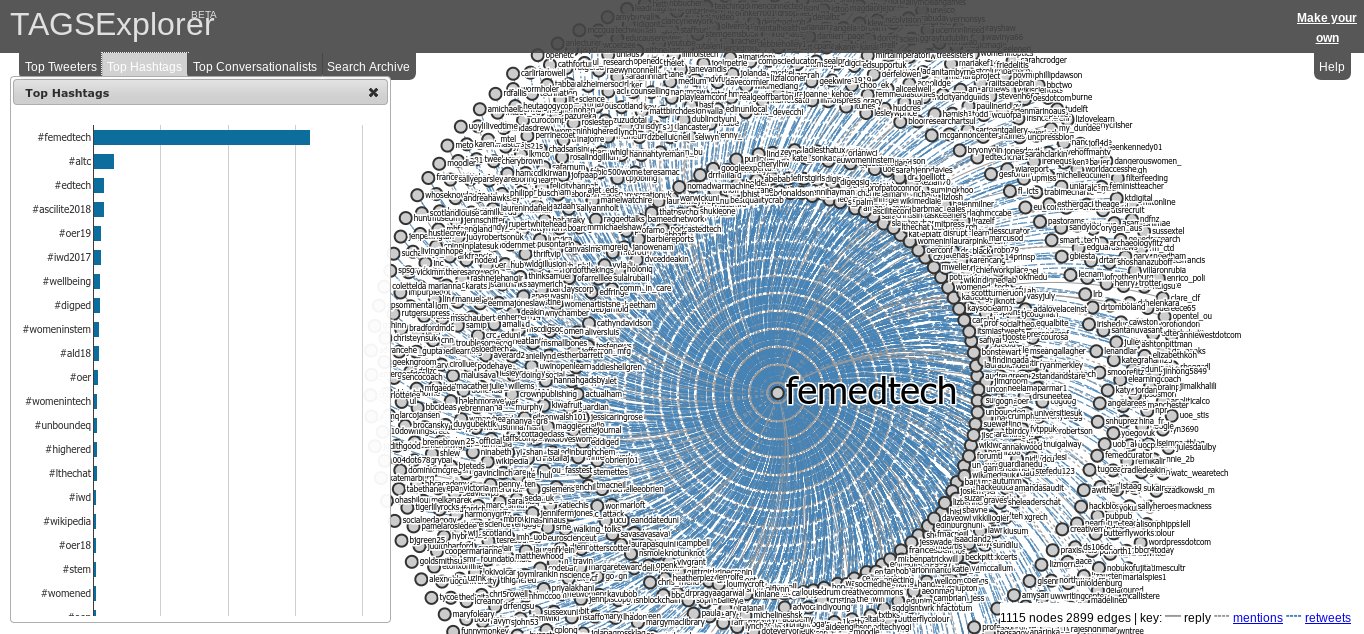I’m at the end of curation slot for #femedtech/@femedtech, a volunteer network for feminists in Edtech. In this post I want to share why I wanted to curate this network and some highlights from my 2 weeks.
To take you back to the beginning or my own personal journey, inequality is a topic I’ve been interested in for a number of years. A moment that stands out for me as probably the beginning was the FOTE14 Women in Technology Panel. This panel had a wide ranging discussion from employment opportunities/recruitment processes, to discussing whether there are gender differences. Sitting in the audience I remember thinking to myself ‘say nothing, just listen’, but towards the end I tweeted:
To this Mira Vogel (@TrabiMechanic) made the very valid comment:
@amysampsonuk @mhawksey interesting scenario when the middle managers are all/mostly women but above and below them all/mostly men…
— TrabiMechanic (@TrabiMechanic) October 3, 2014
I’ll come back to the FOTE14 panel but another moment that relates to this is highlighted by comedian and feminist Deborah Frances-White in Richard Herring’s Leicester Square Theatre Podcast (RHLSTP). In the podcast Deborah recalled her experience of working as a nanny in London. Having not lived in London up until that point and having heard terrible things about London traffic she was initially nervous of ferrying the children around in the family’s Land Rover. The advice she was given was she had to be aggressive to get around the streets of London. Deborah’s experience was actually the opposite, drivers always letting her out of junctions, however, when she drove her boyfriends VW Golf her experience was the complete opposite. It was only after her boyfriend explained that she could drive the VW Golf like the Land Rover. The difference? She drove the Land Rover like a tank, driving down the middle of the road making sure that everyone got out of the way – that’s when the penny dropped:
ah, I thought everyone else was being polite, but it turns I’m an arsehole
Deborah Frances-White
Deborah relates this to behaviour you are likely still to encounter in many workplaces, where guys are just aggressively barreling through the day thinking everyone else is being polite but instead they are just being arseholes (cued clip – 50:02):
This is one of the challenges we have with achieving equality across society. Many, I’d go as far as saying most guys, don’t see equality as a problem. They think women got the vote and everyone is happy now. They also don’t understand that their behaviour in itself can create inequality.
It was only when I rewatched the FOTE14 Women in Technology Panel that the issue of masculine and feminine traits in the workplace was raised, research showing in the last couple of decades women’s behaviours are becoming more similar to what is traditionally characterised as ‘masculine’. The question being should women become more masculine or should our systems, hierarchy and our organisations should become more feminine (cued clip – at 32:35).
So the reason I wanted to curate femedtech was to help me get a better understanding of inequality in EdTech and I suppose in some way check I wasn’t being an arsehole. As part of this there were several things I don’t think I would have seen or heard that stand out for me which I’ve highlighted below:
Chatbots
I was keen to bring a bit of me to the @femedtech curation so with a developer hat one I was interested and delighted to outputs from the ‘Designing a Feminist Alexa’ project:
From the report this quote from Jaqueline Feldman:
By creating interactions that encourage consumers to understand the objects that serve them as women, technologists abet the prejudice by which women are considered objects.
Jaqueline Feldman
Related to this was this tweet:
In 1986 Sherry Turkle wrote:
the computer has no inherent gender bias. But the computer culture is not equally neutral
Sherry Turkle
It’s interesting in the context of the ‘Designing a Feminist Alexa’ project and other developments in artificial intelligence and machine learning that computing is itself potentially becoming gender bias.
Related to this is the tweet from #TEDxLondonWomen:
Changing culture
Another theme was around culture:
In response to this Frances Bell commented:
It had never occurred to me that beside workplace traits that the physical design of workplaces are not always gender neutral. Toilets are an easy example, partially the ratio of space, but also location can be an issue. For example, how many of you have been at events where in the welcome housekeeping gents are informed the toilets are down the corridor, but the ladies are two floors down, or limited in some other way? It’s more than just the facilities though and Frances’ comment prompted me to find and share:
Still a long way to travel…
Earlier I said “they think women got the vote and everyone is happy now”, the following tweets are a reminder that inequality is abundant in our institutions and society:
So guys if you want a better understanding of inequality in EdTech why not follow #femedtech/@femedtech and ask yourself “am I being an arsehole?”
